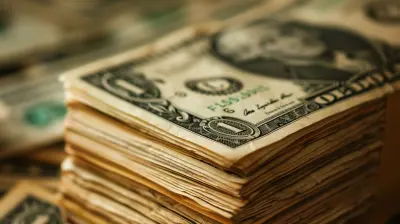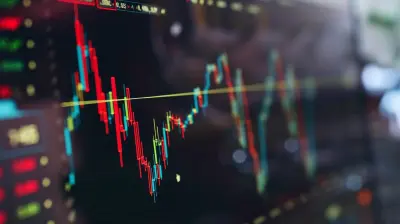21 January 2025
The housing market is like that one friend at a party who always finds a way to become the center of attention. Whether it’s soaring house prices, bidding wars, or the inevitable chatter about when the next bubble will burst, it always has everyone talking. But here's the kicker – the effects of the housing market don’t just stop at homebuyers and sellers. Nope, it spills over into the broader financial markets, shaking things up like a rippling wave in a perfectly calm pool.
What’s fascinating – and a little scary – is how the housing market bubble is directly driving changes in finance markets. It’s a story of domino effects, evolving policies, and, let’s be honest, a whole lot of uncertainty. So, grab a cup of coffee (or tea, no judgment), and let’s dive into what’s really going on here. 
What is a Housing Market Bubble?
Okay, before we get too far ahead, let's talk about the basics. What’s a housing market bubble, anyway? Imagine blowing up a balloon. At first, it’s fun and exciting; you can see it getting bigger and bigger. But deep down, you know if you keep going, it’s going to pop. That’s essentially what happens in the housing market.A housing bubble occurs when property prices become inflated beyond their actual value – often driven by high demand, speculation, and, let’s be honest, a touch of greed. People start buying homes not because they need a place to live, but because they see dollar signs in their future. It’s great until it’s not. When the bubble bursts, it usually leaves behind a mess of falling prices, underwater mortgages, and financial chaos.
But here’s the twist: the shockwaves from this "pop" reach way beyond housing. They spread to the financial markets too. 
The Housing Market Bubble and Its Ripple Effect
1. Investor Behavior: A Risk-On Mentality
Think of investors like surfers, always chasing the biggest wave. When the housing market heats up, it creates an illusion of endless growth. Investors, sensing an opportunity, dive headfirst into real estate-backed stocks, mortgage-backed securities, and related financial instruments.But what happens when the wave crashes? Investors often scramble to reposition their portfolios. This "risk-on, risk-off" behavior creates volatility in finance markets. One moment, it feels like a gold rush, and the next, it’s a full-blown panic.
For example, the 2008 housing bubble didn’t just affect homeowners. It wreaked havoc on Wall Street, leading to a global financial crisis. And while we’ve learned some lessons since then, the housing market still has the power to set finance markets on edge.
2. The Role of Interest Rates
Interest rates are like the thermostat for the economy – crank it up, and things cool down; lower it, and things heat up. The housing market bubble often forces central banks to adjust these rates, which can send shockwaves through financial markets.When house prices start skyrocketing, central banks might raise interest rates to cool things off. On the flip side, if the bubble bursts, they lower rates to spur borrowing and economic activity.
Here’s the catch: these changes don’t just affect home loans. Interest rate shifts can impact everything from bond prices to stock valuations, making the finance markets dance to the housing market’s unpredictable tune.
3. The Rise of Alternative Investments
Let’s face it – traditional investments like stocks and bonds don’t always feel exciting. When the housing market bubble inflates, some investors start exploring alternative assets. Real estate has historically been viewed as a "safe haven," but when the market gets overheated, people look elsewhere.Ever heard of real estate investment trusts (REITs)? They’ve become increasingly popular as they allow investors to dip their toes into real estate without directly buying property. Similarly, we’re seeing a rise in assets like cryptocurrencies and peer-to-peer lending platforms as investors hedge their bets against housing market volatility.
It’s like switching from binge-watching Netflix to exploring indie films – sometimes you need to diversify your entertainment (or portfolio). 
Shifting Policies and Regulations
1. Tighter Lending Standards
Remember when it seemed like anyone with a pulse could get a mortgage? Yeah, those days are long gone. Housing bubbles have forced governments and financial institutions to rethink their lending practices.Post-2008, tighter lending regulations were introduced to prevent reckless borrowing. This has had a direct impact on the finance markets, making credit less accessible. While this reduces risk in theory, it also slows down economic growth. It’s a delicate balancing act, like juggling flaming torches – one wrong move, and ouch.
2. The Emergence of Fintech
When traditional systems face pressure, innovation often steps in to save the day. The housing market bubble has been a breeding ground for fintech companies, which aim to disrupt the status quo.Companies now offer smarter mortgage solutions, digital lending platforms, and AI-powered investment tools. Not only do these platforms make financial services more accessible, but they’re also helping to reshape the way finance markets operate in the wake of housing market upheavals. 
How Finance Markets Are Adapting
1. Focus on Data-Driven Decisions
If the housing bubble has taught us one thing, it’s this: gut instincts are overrated. Finance markets are leaning heavily on data analytics and predictive modeling to make sense of market trends.By analyzing housing market data – such as price trends, foreclosure rates, and buyer demographics – financial institutions can better predict and prepare for potential risks. It’s like having a crystal ball, but with spreadsheets.
2. Globalization of Finance Markets
The housing market isn’t just a local phenomenon anymore. Thanks to globalization, financial markets are more interconnected than ever. A bubble in one country’s housing market can trigger reactions in markets halfway across the world.This interconnectedness has forced financial institutions to think globally and diversify their investments. It’s a bit like keeping your eggs in multiple baskets – only these baskets are scattered across the globe.
What Does the Future Hold?
Predicting the future of the housing market and its impact on finance markets is a bit like predicting the weather – sometimes you’re right, but often, you’re way off. However, there are a few trends worth keeping an eye on:- The ESG Boom: As environmental, social, and governance (ESG) criteria gain popularity, there’s growing interest in sustainable real estate investments.
- Digital Real Estate: With the rise of the metaverse, virtual real estate could emerge as a new asset class, further blurring the lines between housing and finance markets.
- Demographic Shifts: As millennials and Gen Z enter the housing market, their preferences could reshape demand, influencing both property prices and investment trends.
Final Thoughts
The housing market bubble is like a wild rollercoaster ride – thrilling, unpredictable, and sometimes terrifying. But beyond the ups and downs, it’s also a powerful force driving change in finance markets. Whether it’s influencing investor behavior, sparking regulatory shifts, or fueling innovation, its impact is far-reaching.As we navigate these changes, one thing is clear: the relationship between the housing market and finance markets isn’t going anywhere. So, buckle up and keep an eye on those real estate trends – they just might hold the key to the future of finance.












Fern McMahon
The housing market bubble is reshaping finance, influencing investment strategies and risk assessment across various sectors.
February 8, 2025 at 8:51 PM